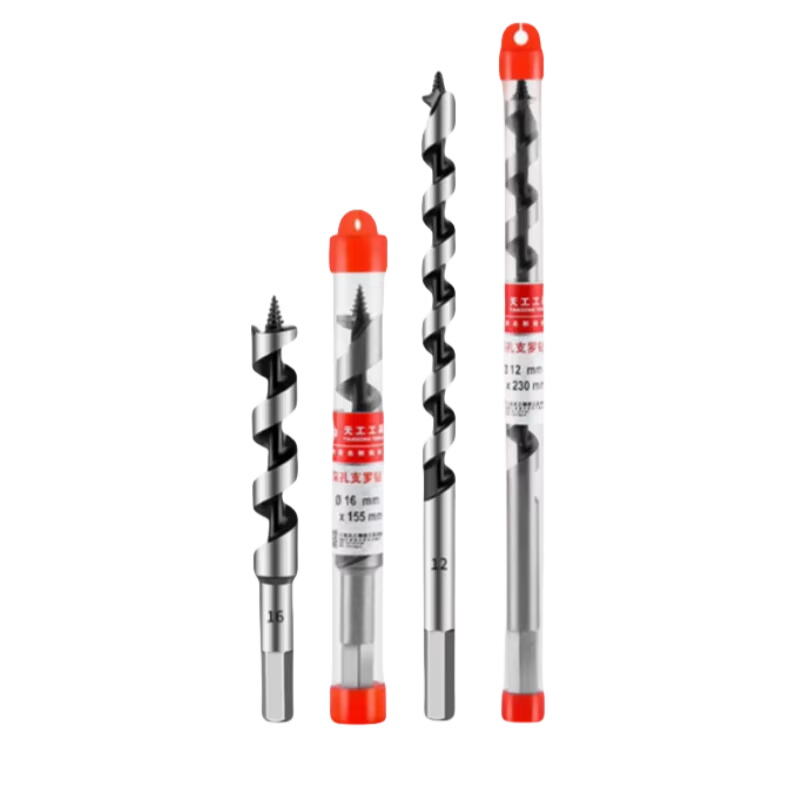What is a Step Drill Bit?
Definition and Unique Design Features
Step drill bits stand out as must-have tools thanks to their distinctive cone shape with several different diameters built right in. What makes them so handy is this stepped design where each level gets progressively bigger, letting users create holes of different sizes without switching bits all the time. Most quality step drills are made from tough stuff like high speed steel or even cobalt alloys, which means they last longer and hold up better against wear and tear. The spiral flutes along the bit help clear out chips while drilling, resulting in cleaner holes overall. A lot of modern step bits also feature smaller shanks that fit into regular drill chucks, making them compatible with most common drilling setups whether working on metal projects at home or tackling industrial fabrication tasks.
Purpose of Step Drill Bits in Modern Toolkits
Step drill bits have become essential parts of many toolkits because they can make several different hole sizes all from one bit. What this means practically is less switching around between various drills when working on projects, something that saves time whether someone works professionally or just tinkers around at home. Mechanics in auto shops and technicians installing heating systems find these bits particularly useful since they get precise results without needing extra equipment lying around. Another great feature worth mentioning is how these bits naturally smooth out the edges of holes as they go through material, cutting down on those extra steps where workers would normally have to clean up rough spots afterward. For factories running tight schedules, this translates into real money saved on labor hours. With so many functions packed into one durable tool, it's no wonder why step drill bits keep showing up again and again in workshops across different trades.
Key Applications of Step Drill Bits
Sheet Metal Fabrication
Sheet metal workers rely heavily on step drill bits because these tools create clean, precise holes needed for building metal parts and assemblies. When working with fastening hardware such as screws and bolts, the stepped design lets craftsmen gradually enlarge holes without warping materials or leaving unsightly burrs behind. The result? A much better finished product that stands up to inspection standards across manufacturing sectors. Industry insiders point out real world gains too – some shops report productivity jumps around 30% when switching to step drills over traditional methods. Beyond just saving time on the job floor, these specialized bits cut down on waste and rework costs, making them worth every penny in most production environments.
Electrical and Plumbing Installations
Step drill bits have become essential in electrical and plumbing work where holes need to be made for all sorts of conduits and pipes that come in different sizes. These bits let pros handle both PVC and metal conduits without much hassle, something that matters a lot when working against tight deadlines on site. Electricians and plumbers I've talked to mention they reach for step drills most often because they get the job done faster and with better accuracy compared to other methods. Nobody wants to spend extra time setting things up when there's pressure to finish projects quickly. What makes these tools so handy is how they eliminate the need to carry around half a dozen different bits just to make holes of varying sizes. Contractors can pack lighter and focus more on getting the actual installation completed instead of fumbling through their toolbox looking for the right bit.
DIY Projects on Plastic and Wood
A lot of folks who love doing their own repairs and renovations swear by step drill bits when working with plastics and woods around the house. What makes these tools stand out is how they cut through materials without leaving those annoying chips and splinters behind, which means cleaner looking results especially important for visible parts of projects. Homeowners often reach for them when making holes for screws, installing dowel joints, or adding decorative touches because they just work so much faster than traditional methods. People talk about how easy these bits actually are to handle during weekend projects, and it's no wonder why more people are keeping a few in their toolboxes now. The simplicity factor alone explains why many tackle wall hangings, furniture assembly, and other household fixes with these versatile little tools instead of struggling with standard drills.
Advantages of Using Step Drill Bits
Efficient Multi-Size Hole Drilling
What makes step drill bits really shine is how they tackle holes of multiple sizes in one go. Users don't have to switch out bits every time they want a different diameter, which speeds things up quite a bit during work sessions. On jobs where lots of varying hole sizes are needed, these specialized bits cut down on all those annoying bit changes that regular drills require. According to some field reports from manufacturing shops, this kind of efficiency boost actually cuts down on labor expenses and gets projects finished faster than traditional methods. For tradespeople who want maximum productivity without wasting time swapping tools around, being able to move smoothly between hole sizes becomes a real game changer in day to day operations.
Deburring and Smooth Edge Creation
Step drill bits can create holes and at the same time smooth out rough edges, which makes them pretty handy for anyone working on projects where safety matters and things look good when done. The fact that they handle multiple jobs means less need for extra tools just for finishing work. That saves time and cuts down on how many different tools someone needs to carry around for various jobs. Woodworkers and metal fabricators tell us they spend less time cleaning up after drilling because these bits do so much already. Instead of wasting precious minutes on those final touches, craftsmen get to move right into putting pieces together or installing components. Having all these functions packed into one tool really boosts efficiency and helps produce better quality results across different types of manufacturing and construction work.
Cost Savings and Tool Versatility
Step drill bits save money because they can do the work of several different bits at once, so people don't have to buy as many separate tools. When workers spend less time switching between drills during a job, projects get done faster and cheaper, whether someone is fixing up their garage or working on a big construction site. Fewer tools means less cleaning, sharpening, and replacing over time too. According to some industry stats, tradespeople who go for multi-purpose tools tend to see around 20% better profits from their work. That makes sense when looking at all the hidden costs saved by not having to maintain an entire toolbox full of specialized bits. Step drills just make good business sense while still getting the job done right.
Key Applications of Step Drill Bits
Sheet Metal Fabrication
When working with sheet metal, step drill bits make it possible to drill holes for screws and bolts without creating rough edges or damaging the surrounding material. These tools gradually enlarge the hole as they cut through metal, which helps prevent warping and those annoying little burrs that ruin a good finish. Shops report around a 30 percent boost in productivity when workers switch to step drills instead of traditional methods. For anyone serious about metal fabrication work, having the right step drill bits on hand is just part of doing business properly. They save time and money while keeping projects looking professional from start to finish.
Electrical and Plumbing Installations
Electricians and plumbers know how valuable step drill bits can be when working on installation projects. These tools let them drill holes of the right size quickly for things like conduit and pipes without switching bits constantly. What makes them so handy is their ability to handle different materials too. Whether it's cutting through PVC or metal conduits, these bits save a lot of time on site. According to industry reports, most pros have started favoring step drills because they cut faster and more accurately than traditional methods. This matters a lot in real world situations where every minute counts. The combination of speed and accuracy means fewer mistakes and less frustration during those tight deadlines that come with most construction jobs.
DIY Projects on Plastic and Wood
A lot of people who love doing their own repairs and improvements find that step drill bits work really well when working with plastic and wood. The way they're designed helps reduce those annoying chips and splinters that can ruin a project's appearance. When making holes for screws, dowels, or even some fancy decorative touches around the house, these tools just speed things up considerably compared to regular drills. Most folks who have tried them talk about how easy they are to handle and how effective they turn out to be for all sorts of home jobs. What makes these bits so popular is that they switch from one material to another without messing up the finish, which means homeowners don't have to worry about swapping out different drill bits halfway through a job.
Materials Compatible with Step Drill Bits
Thin Metals: Aluminum, Copper, and Steel
Step drill bits really shine when tackling thin metals such as aluminum, copper or mild steel sheets. The way they're designed gives much better precision and cleaner edges than standard bits, something anyone who works with delicate materials quickly notices. What makes them special is their stepped shape, allowing for quicker drilling while keeping heat down. This matters because too much heat can warp those thin metal sheets, especially when someone isn't using proper technique. Choosing the right drill bit matters a lot for two reasons actually. First, it extends how long the tool lasts, and second, it just looks better in the finished product. Most shop tests back this up showing that getting the selection right makes a big difference in how long the bit stays sharp and works properly. For anyone regularly cutting through thin metal stock, step drills simply make sense. They get the job done faster while still maintaining that critical level of detail that many projects demand.
Non-Metal Materials: Plastic, PVC, and Laminates
Step drill bits work really well when going through things like plastic, PVC pipes, and those layered laminate surfaces too. Regular drill bits tend to crack or split these materials while drilling, but step bits avoid that problem altogether. What makes them so useful is their ability to handle different hole sizes without needing multiple tools, something that comes in handy during home renovations, fixing leaky水管 (water pipes), or even working on woodcraft projects. Most people who enjoy tinkering around their homes find these bits particularly valuable since they keep plastics and other soft materials intact instead of tearing them apart. The result? Cleaner holes and better looking finished products across all sorts of non-metal projects, which explains why so many workshop regulars reach for step drills first.
Limitations for Hardened Metals and Thick Materials
Step drill bits work great for many jobs but they struggle with really tough stuff like hardened steel or thick metal plates. For these kinds of materials, regular step drills just won't cut it if we want good results. Try using them on hardened metals and watch them dull out super fast, which means replacing them way too often. Anyone working with metal knows this already. The bottom line is matching the right tool to what needs drilling makes all the difference between frustration and success. When facing those stubborn materials, grabbing a cobalt drill bit or something designed specifically for hard metals saves headaches down the road and keeps projects moving forward without constant interruptions.
Frequently Asked Questions (FAQ)
What materials can step drill bits work on?
Step drill bits are suitable for thin metals like aluminum, copper, and mild steel, as well as non-metal materials such as plastic, PVC, and laminates.
Are step drill bits suitable for drilling hardened metals?
No, step drill bits are not recommended for hardened metals and thick materials, as they can wear out quickly. Specialized bits are advisable for such tasks.
What are the key advantages of using step drill bits?
Key advantages include efficient multi-size hole drilling, deburring and smooth edge creation, cost savings, and tool versatility.
Do step drill bits reduce the need for additional tools?
Yes, step drill bits minimize the need for extra finishing tools and numerous individual drill bits, reducing both costs and toolset size.
How do step drill bits enhance project efficiency?
They increase workflow pace by eliminating frequent bit changes, offer deburring and smooth edge creation, and reduce secondary operations, thus saving time and labor.


